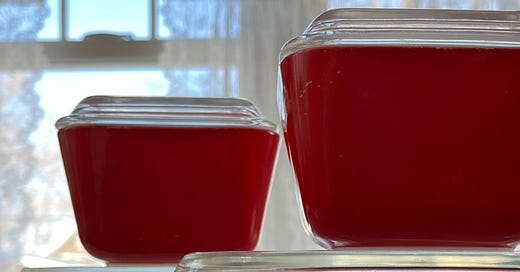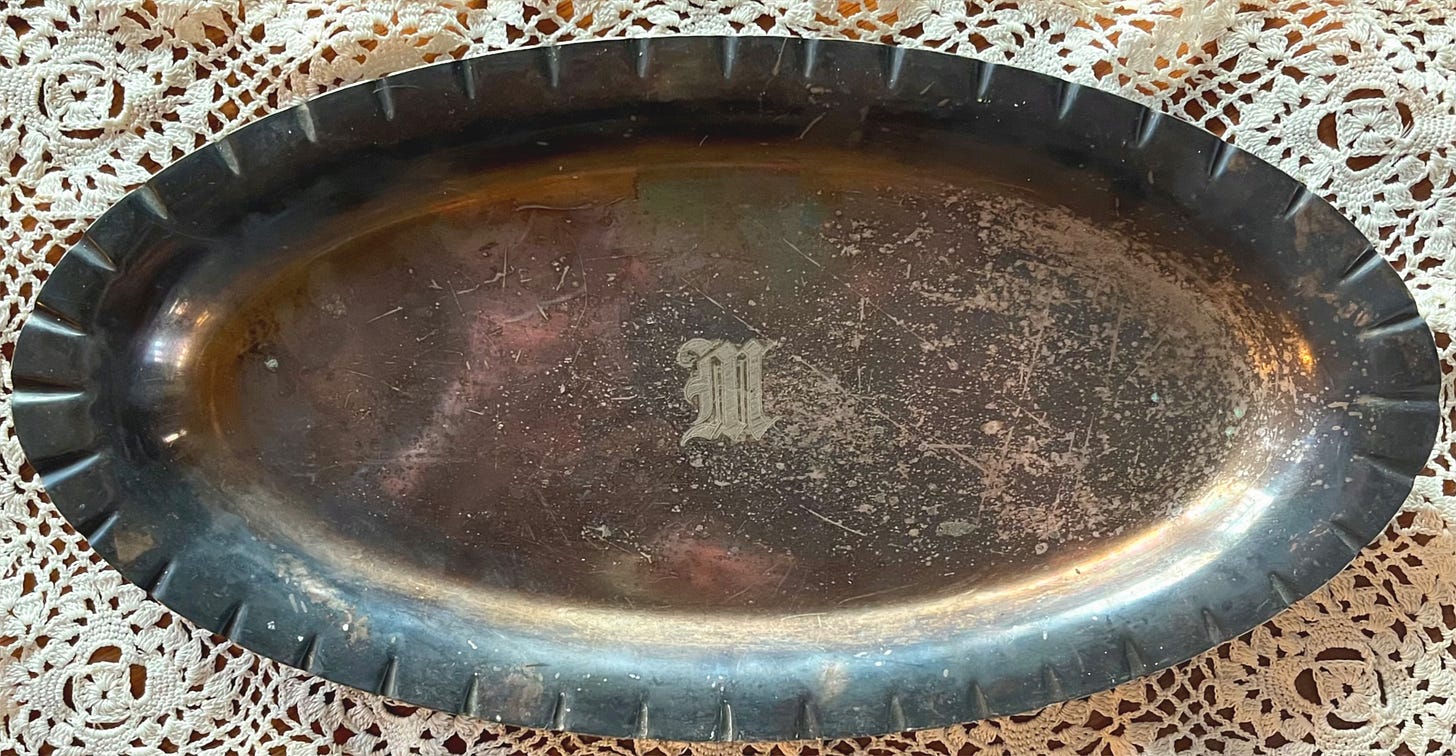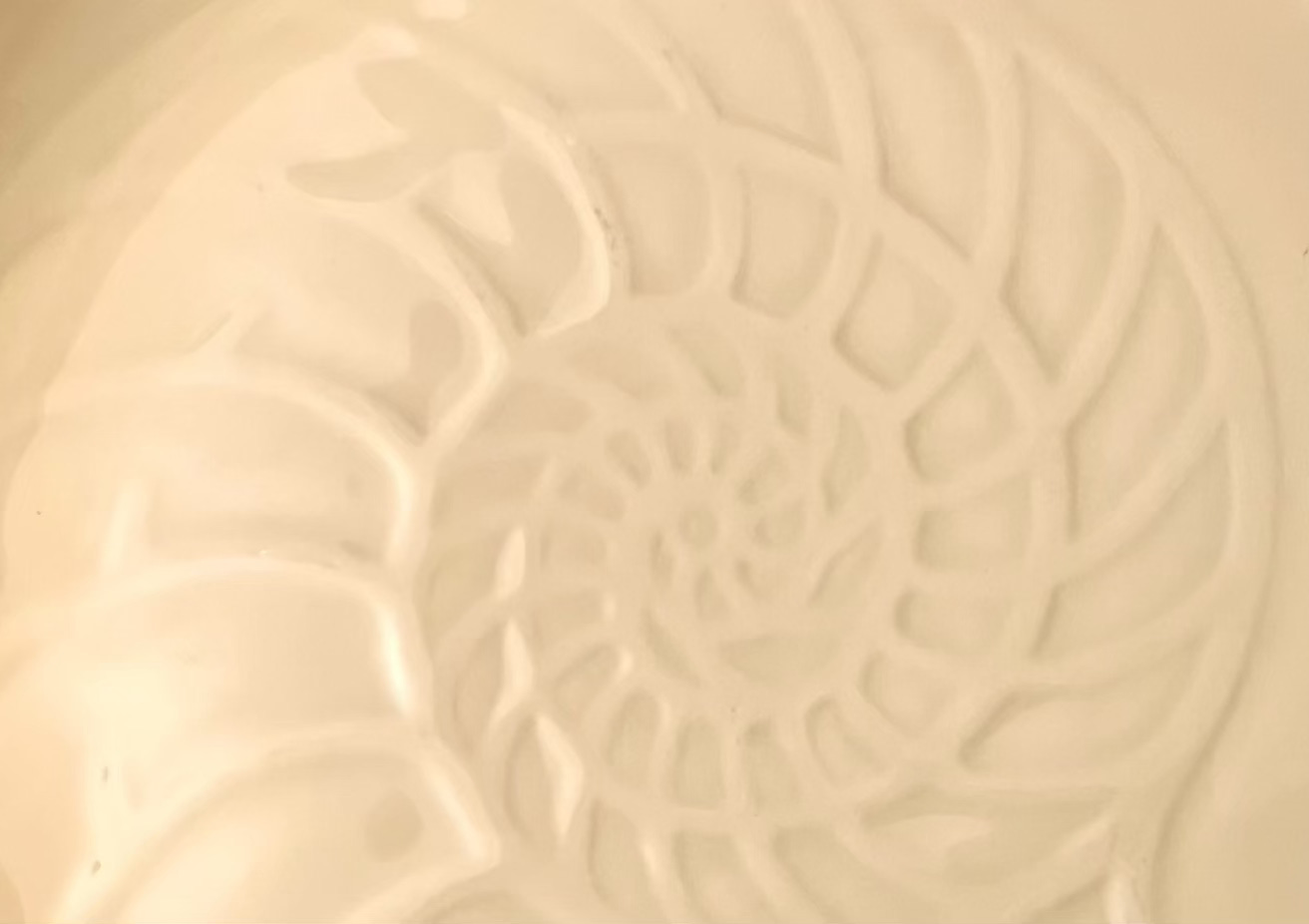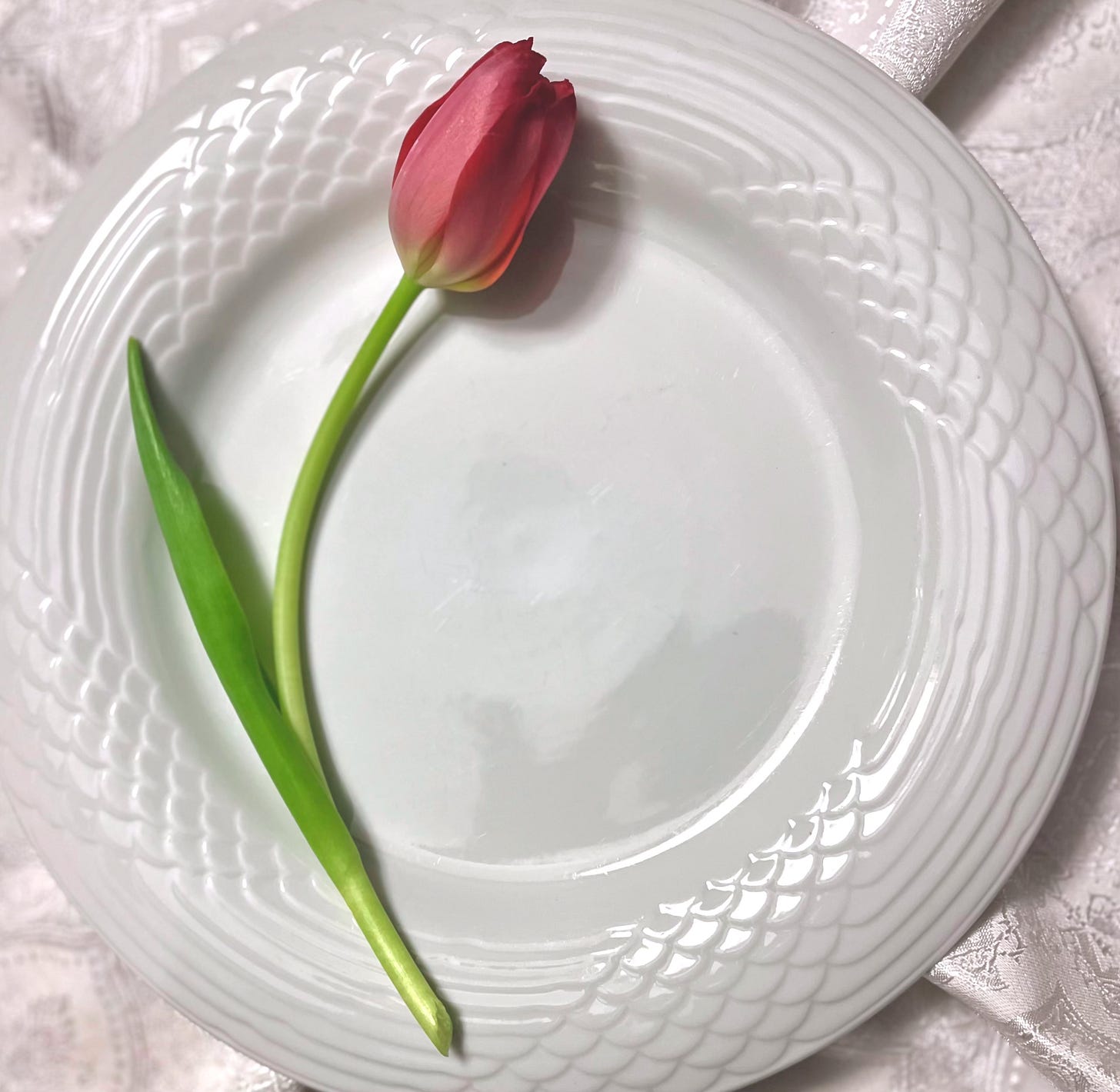I have too many dishes. My children don’t have enough.
You’d think it would be easy to redistribute the wealth. I could slip a platter or a gravy boat into the bag when I send them home with leftovers. Who doesn’t want extra hollandaise on their asparagus? My children love hollandaise. But when it comes to serving vessels, they are minimalists.
It’s not like they’ve filled Pinterest boards with tiny houses or rejected a middle-class lifestyle. But they don’t entertain. No parties, no shindigs, no backyard barbecues.
My son and his wife are like a pair of shoes that last forever and keep their shine: sensible, enduring. Endearing. But not for dancing.
For them, a streamlined service for eight — dinner plates, soup bowls, mugs — strains the limitations of space. They don’t want to run the dishwasher every day. But the rice cooker, immersion blender, and Instant Pot take precedence. Timesavers. The bar cart is in the kitchen not as a bold decorating choice, but because that’s where the fridge is. Making a bloody Mary shouldn’t require a trip around the block.
“We’re good, Mom. But thanks.”
Would it hurt to take in some pair-bonded ramekins or a cake pedestal? How about this ruby glass plate, for that fabulous Pavlova you don’t make often enough?
“All right,” I say. “But if you change your mind . . .”
They won’t.
My daughter’s tastes are calibrated to mid-century modern. Her kitchen is more MOMA than mom. When I ask her to come over to go through a few things, she’s careful to spare my feelings. She doesn’t say, Ughh, not another Antiques Roadshow.
Instead, she says, “It’s all so nice. I just don’t need anything.”
She has my hourglass-shaped Chemex coffeemaker, weighty and hand-blown, not like the ones they make now that break if you look at them. I’ve upped the ante with my mother’s set of four nesting Pyrex bowls and matching stacked casseroles, circa 1952.
I’ve hit the sweet spot.
“All right. I’ll be over around two.”
Yesss.
We’re in the dining room. On one wall, the shelves of a built-in hutch hold an array of Chinese porcelain, including flat-bottomed soup spoons and sweet, tiny sauce bowls. The real treasures are in the buffet on the opposite wall, and behind the curved glass door of my china closet.
“Here’s your great-grandmother’s wedding plate.”
“Uh-huh.” She doesn’t look up. The plate has been around for so much of her life that the scalloped edges and pink hand-painted flowers are part of the ambient background. A bit of fussy wallpaper. My grandmother gave the plate to my mother; my mother gave it to me. I tell myself that it doesn’t matter who gets what.
“What should I do with these?”
A handful of frilly crocheted things: doilies.
I wince. “Make them go away.”
She tosses them into a cardboard box labeled Toss. Doilies. What a waste of human potential. I reach deep into the buffet, and pull out something I’d forgotten: my grandmother’s bread tray.
Although the plated silver is tarnished, you can still make out the Gothic letter M inscribed in the center. My daughter shares the initial with me, her grandmother, and her great-grandmother. I imagine four women of different generations arranging thin slices of lemon pound cake for afternoon tea. I set the tray on the table.
Instead of adding it to the rejects, she runs her hand around the crimped outer edge, then traces the outline of the M.
“This is nice. I like the font.” She pauses. “Are you sure you don’t want it?”
Be still my beating heart. I am passing on a family heirloom to my daughter.
“It’s yours. I’ll polish it first.” There’s a bottle of TarniShield in my graveyard of cleaning products, dried-out paste rattling inside. “I’m sure Ace Hardware has something.”
“Go on YouTube.”
“Great idea. Why didn’t I think of that?” Because you’re old. That voice, a small hiss, as of a kettle placed on a low burner and forgotten until it sizzles dry.
I start wrapping my mother’s casseroles in tissue. The yellow rectangle always held tuna with noodles; the blue oblong, salmon loaf. Leftovers, if we had any, went into the two small red dishes: a cup of mashed potatoes or wax beans.
“Can I leave them here for now?”
The bandage on her hand: neuropathy. A few days ago, she dropped a glass of juice on the floor, and cut herself on a jagged edge. No stitches. Just antibiotics, to keep from developing sepsis like that time with the tooth extraction.
“Sure, hon. No problem. Dinner this Sunday? You guys can play another murder-mystery game. Talk to your brother.”
As she returns to her car, her vivid red hair and quick pace give no hint of the chaos within her cells. Her head rages most days with migraines, a result of the vascular damage from chemotherapy. Her spine. Neck. Left side. She wakes — if she sleeps at all — feeling like barbed wire set aflame. The pills help, sometimes. The nerve block three weeks ago.
I don’t want to think about the news, and what is coming. The cancer is cruel enough.
After she leaves, I open YouTube.
The consensus view (easy! no mess! fast! works like a charm!) is that to clean silver I need salt, vinegar, boiling water, a roasting pan lined with aluminum foil, and adequate ventilation.
I go with the minority opinion: ketchup.
I squirt a tablespoon onto a rag, then smear it on the tray. Working it into the grooves and crevices, I’m careful not to scrub where the base metal shows through. I rinse, add more ketchup, rub. Repeat. After half an hour, the tray seems brighter. I take it to the sunroom.
Knife cuts mar the surface. I imagine my grandfather, my uncles, dividing the last piece of Christmas bread, pushing against the surface with a sharp blade. My jaw tightens, perhaps as my grandmother’s did, a century ago.
It doesn't look better. Or worse. You might get a quarter for it at a garage sale.
But the M. It’s stronger. I like the M.
For no good reason, I have four sets of dinnerware.
None are fancy, and none are complete. Parts are missing, like the packages of chicken my mother bought because they were cheaper. Parts are missing because of the days of small hands and extended-family Thanksgivings. We crammed two dozen people around our tables before they died or married or went off to make their own Thanksgivings. Before I just — stopped.
In those days, I baked pies. Wallpapered the day before, tabulated the damage the day after. Chipped cups, saucers that must have ended up in the trash. Years later, I spent way too much time at Replacements.com, trying to find, among their inventory of millions of pieces, a match for one of those vanished or damaged things, at ten times the original price.
No bride — no couple — requests an odd number of tableware items in their wedding registry. Seven soup spoons, three champagne flutes? Never.
Dinner plates, like dinner guests, are invited to the table in multiples of two. Someone who shows up alone is an inconvenience: add a chair, or remove one. Odd numbers violate the natural order.
In this house, we’re down to one person at the table: me. A widow. A party of one. It feels worse than odd. After forty-three years of marriage, it feels unnatural.
But this is where I am.
Dearest,
We need to talk about the kids. But first:
You’ve been gone almost two years but maybe you know. Mini is still with us. Twenty-two years old. Nine lives, ha. How many times has she messed with our hearts?
Bodhisattva: A being who has attained enlightenment, but stays in this world to help others instead of blasting off into nirvana, which at more than a hundred in human years she has every right to do. That’s our little Dalai-Mini.
I talk to myself. Worry about falling. Dementia. Traumatizing the little girl next door, walking around the house, talking and gesturing. She sees me through the windows, an old woman. A once-trusted adult, now yelling. Crying. Unhinged. Maybe I’ll have to go back to work to pay for her therapy. Have we discussed this? Budgeted for it? Sorry if we have. I’m old. I repeat myself.
I bought groceries today. Eggs, eight dollars. All because of a virus, not Covid but a new one. Wiping out flocks. No one can tell us what’s safe anymore. Maybe you know about this. Seen me shaking my fist at the TV. Another thing I need to be careful about. Pull the shades, Mary! It wouldn’t hurt for you to remind me.
I’m eating at the coffee table, sitting on the rug. Dimmed the lights. I don’t want them thinking She’s eating alone again, how sad. Talking to herself. Maybe we should stop over, have a little conversation, try to be kind but let her know she’s scaring our first-grader to death.
Do you remember my Uncle Gus?
After my grandparents died and he was alone on the ranch, he was a little bit different in the head. At night, he’d have these loud conversations with himself. Shouting and muttering. One day when Mom made breakfast and I was setting out the plates, they had a pretty design except for the one on top. It had completely faded. That was the plate Uncle Gus used.
And that was Uncle Gus. Faded.
I know I was nutty about dishes. Ten cereal bowls, but we never had ten people over for cereal. We did have those big Thanksgivings. Easter and Christmas, too. It was something I loved to do: have people over. Until I didn’t.
Cook, until I didn’t.
Now, I do. Cook. And the kids come over, but they don’t want my dishes.
It’s okay. I make sure they come often enough that I don’t end up with one faded plate.
Maple-glazed salmon, on a bed of white rice and sautéed kale. So good. I baked the salmon longer than you did, but now, the food supply, you just don’t know. No one knows. The rice isn’t perfect, but I’m getting better.
The kale? I charred it a little. All right, I walked away without turning down the heat. But caught it in time. Almost as good as what we had in Seattle. I don’t remember the rest of the meal. Could have been wagyu beef, or caviar. We went back to that restaurant three times for the kale.
About the kids.
I can’t shield them from the birds of prey bearing down on them. We don't yet know their size or their strength.
In the meantime, there are still beautiful, unbroken things in this world.
Love,
Mary
When you share, or hit the ❤️ button at the bottom of the page, it helps people find me. Better yet, leave a comment. I love to hear what you think. There’s a wonderful community of readers here at Writer, interrupted. Join us, and join the conversation.
Writer, interrupted is a reader-supported publication. Free subscribers receive most of my posts in your inbox. You can also read them in your browser or on the app. Paid* ($50 annually) subscribers receive all of the above, as well as some extras: bonus posts, threads, chats and ~ coming soon, fingers crossed ~ video and audio content. Substack has great new features. I’m excited to share. Those who join as an Angel ($75 or above) have a choice: a personal conversation with me, or I will write you a poem on a subject of your choice. All subscribers have my undying gratitude.
Only a very small number of writers are honored with a Substack Featured Publication award. of Substack Writers at Work calls this the “pinnacle of achievement” on Substack. What this mean for you is this: I promise to send you only my very best writing.
* We live in uncertain times. Many of us face challenges and hardships. I have been there. If price is an issue, please send me a message.
There’s an app, too. You can take me along wherever you go.













So full of truth and heartache. I hesitate to begin a reply fearing it will turn to essay. Our offspring are accustom to easy replacement; grew up on flagrant consumption as a lifestyle, a cultural norm. I fear those days are drawing near a close. The value of good enough; the fear of scarcity are bearing down on us. Which brings me to the sweet and tender value of your treasures. They hold not only memories (our shorthand "grandma's bread tray") but the ghost of their touch lingering on the rim. Love how you invoke that, the wabi sabi investing that much more value in "all the things." More importantly, my heart hurts as you bear witness to your daughter's tenacity and suffering. I'm painfully familiar with that particular heartache. Another commonality, and apologies if I've mentioned it before. Stay the course. You're beyond "good enough."
Love this. I have a big house full of treasures things nobody wants.